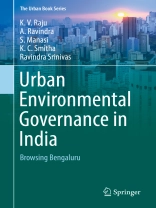This book aims to identify the challenges presented by current urban environmental governance practices in fast growing Indian cities, to propose changes to the current governance implementation strategies, and to explore the best practices to achieve sustainable urban models through Indian and global perspectives. With a focus on the city of Bengaluru, the book draws on extensive reviews of literature and data to present current trends and statuses of environmental resource use in growing urban centres of India.The book analyzes the situations that impact urban environmental governance decisions and outcomes and proposes solutions to address these issues for long-term sustainability. Policy makers, researchers, academics and development practitioners in environmental politics and urban governance will find this work of great interest.
The book starts by examining different urban environmental threats on global and domestic levels, and provides evidence for the effectiveness of sustainable efforts to curb the impact of crisis-like scenarios. Then the book discusses the role of institutional regimes in influencing urban environmental outcomes through policies, and analyzes the role of various actors in the evolution of urban environmental governance from a legal perspective at global and local scales. In the final chapters, the book explores the trends and status of environmental resource management in Bangalore Metropolitan Area (BMA), and examines the dynamics of local institutions and governance structures for regulating environmental governance for promoting effective sustainable environmental governance in Bengaluru.
Содержание
Chapter1. Introduction.- Chapter2. Urban environmental governance: global experiences.- Chapter3. Emerging urban environmental governance models/approaches.- Chapter4. Urban environmental laws and institutions.- Chapter5. Bangalore metropolitan city: an environmental overview.- Chapter6. Trends and status of environmental resource use in Bangalore metropolitan area (BMA).- Chapter7-Local institutions and governance structures for environmental governance: critical issues and emerging options.- Chapter8. Environmental governance in Bangalore.
Об авторе
Dr. K.V. Raju is Leader of the Policy & Impact Research Program-Asia at the International Crops Research Institute for the Semi-Arid Tropics in Telangana, India. He was previously Economic Adviser to the Chief Minister of the Government of Karnataka, and Professor and Head of the Center for Ecological Economics and Natural Resources at the Institute for Social and Economic Change in Bangalore. He has written 14 published books and 97 journal papers.
Dr. S. Manasi is an Associate Professor in the Centre for Research in Urban Affairs at the Institute for Social and Economic Change in Bangalore, India. She has extensive research experience in urban ecology and natural resource management, and has worked in many collaborative research studies with funding from the European Commission, Japan International Cooperation Agency, World Bank, International Water Management Institute, and Government of Karnataka.
Dr. K.C.Smitha is a Research Scientist in the Centre for Research in Urban Affairs at the Institute for Social and Economic Change in Bangalore, India. Her research focuses mainly on urban governance, service delivery, urban poverty, urban informality, urban political economy and urban political ecology. Over the past several years, she has been actively engaged in varied urban research projects such as structure of Indian metropolises, rural-urban migration, urban deprivation, urban infrastructure, urban poor and urban land governance from interdisciplinary perspective. She has published several book chapters and articles in peer reviewed journals.
Dr. A Ravindra is Chairperson, Institute for Social and Economic Change, a leading research institution in social sciences, Bangalore. He served as an IAS officer in various capacities in government before retiring as Chief Secretary to the Government of Karnataka at the end of 2002. He holds a Ph D in Development Studies and has specialized in the urban sector including water management. He was responsible for introducing several governance reforms such as rationalizing property tax system through the Self Assessment Scheme and mobilizing resources for urban infrastructure through municipal bonds. He was instrumental in initiating the Cauvery Water Supply Project (Stage IV) and the Metro Rail Project for Bangalore. He has published several papers and articles on urban and public policy issues. His books include Urban Land Policy, Dance of Democracy and a monograph on Cauvery Water Dispute.
Dr. Srinivas Ravindra is Executive Director, Centre for Sustainable Development (CSD), a non-profit organization that works towards promoting sustainable development activities in the areas of environment, energy and water spread across urban and rural areas in India. He has fourteen years of experience in the field of green skills, sustainable development and other related areas, and has several publications to his credit.












